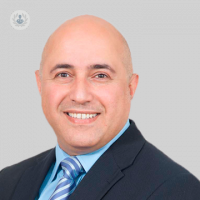Kidney stone prevention
Escrito por:If you have had kidney stones before you are at an increased risk of them coming back - unless of course, you work actively on your diet to prevent them! We spoke to Mr Aza Mohammed, a leading urological surgeon who has over 20 years of experience in the management of complex kidney stones. He advises us on the best and worst foods to eat and what small changes you can make to your diet which will prevent these pesky stones recurring.

What are kidney stones?
Kidney stones are hard formations of salt and minerals found in your urine, often made up of calcium or uric acid. They form inside the kidneys and pass to the urinary tract. They can vary in size and are typically very painful when they pass through your ureter.
What is the best food to eat to prevent kidney stones?
There are different dietary modifications that can help patients with recurrent stones.
First of all, fruits that are rich in citric acids, such as lemons, limes, oranges, strawberries and pineapple can help to prevent stone formation. Citrate in the urine binds to the calcium oxalate and calcium phosphate prevents these from binding further together and forming stones.
Secondly, you should also maintain your daily intake of calcium and vitamin D. Calcium is found in dairy products such as milk, cheese and yogurt. There is evidence suggesting that reducing calcium intake can paradoxically increase the risk of stone formation.
What foods should you avoid if you have recurrent kidney stones?
The three most important dietary items to avoid are organic meat, salts and oxalates.
Organic meats
Organic meats (animal-based proteins) such as red meat and shellfish are ok to eat but only in small amounts. High organic meat consumption results in higher urinary levels and uric acid, which leads to higher uric acid excretion. This means the urine contains more acid and reduced levels of citrate which favours stone formation.
Salt
Restricting your salt intake is also essential if you have kidney stones. Excessive salt intake results in increased calcium in the urine and reduced citrate levels which increases your chances of kidney stones forming again. It can also result in high blood pressure that is a well-known component of metabolic syndrome.
Oxalates
If you have a history of kidney stones, reducing your intake of oxalate can help in reducing the risk of forming kidney stones. Oxalates are a natural substance found in nuts, chocolate, cocoa, beets, sweet potatoes and tea. They bind to minerals and form compounds, which mainly takes place in the colon but can often occur in the kidneys. For some people, a high oxalate diet has been linked to an increased risk of kidney stones.
Research also suggests that increasing your intake of carbohydrates (fructose) results in increased stone incidence. There is also an association between increased carbohydrate intake and metabolic syndrome obesity, both of which are strong risk factors in kidney stone formation.
How much water should you be drinking when you have kidney stones?
The ideal fluid intake to prevent stone formation is two litres per day. This will enhance urine production and prevent precipitation of calcium salts.
What about cranberry juice and coffee?
There are certain beverages such as coffee, tea, beer and wine that have been found to reduce the incidence of kidney stones, while apple juice and cranberry juice will increase the incidence.
Takeaway
Having kidney stones can be a very painful condition, but fortunately, modifying your diet slightly can be a very effective way to manage and prevent. Make sure you stay hydrated and avoid particular foods that are high in salt, sugar and animal-based protein. Maintaining your calcium intake and increasing your consumption of citric acid are also essential elements of a kidney stone diet.
If you would like to book an appointment with Mr Aza Mohammed to get more advice, visit his profile here and check his availability.


